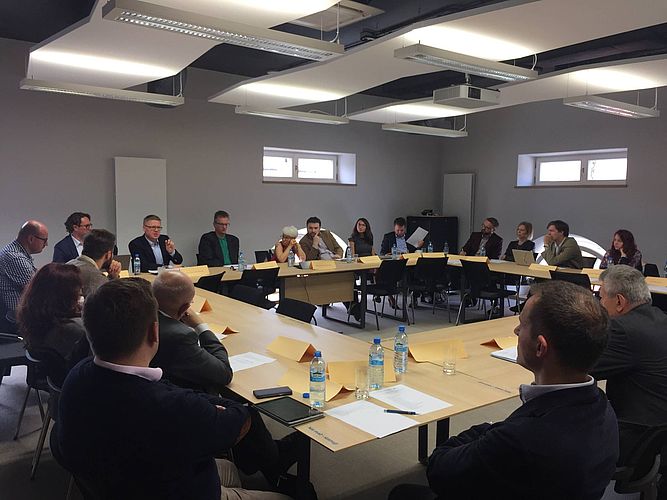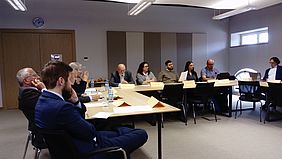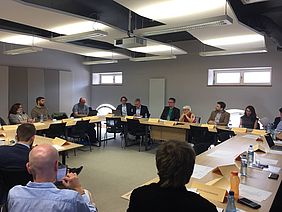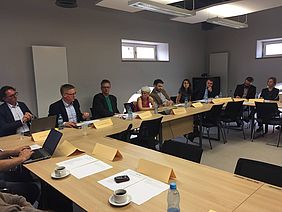The meeting discussed the results of a research project managed by prof. Zbigniew Czachóra and a team consisting of dr Renata Mieńkowska-Norkiene, dr Adam Jaskulski, dr hab. Jarosław Jańczak and dr hab. Piotr Tosiek. Prof. Agnieszka Rothert moderated the discussion.
More than 30 people attended the panel, including researchers on European integration, representatives of non-governmental organizations and journalists. The roundtable discussion began with a presentation of the research conclusions, and an attempt to answer the following questions:
- Was Poland’s European policy active or reactive?
- What have we managed to achieve in the EU?
- What mistakes have we made in Polish European policy?
- What short- and long-term alliances have we managed to build in Europe, and on what issues?
- Have recent years brought a fundamental change in Polish European policy, and in what area is this change particularly visible?
- What comes next in Polish European policy?
The results of the research were contained in statements such as:
- Poland’s European policy was reactive, but it was perceived as effective (e.g. by the Visegrad Group, by representatives of Polish public administration and by large EU member countries, particularly the UK, who mainly stress the pragmatic dimension of this policy);
- Poland’s European policy was implemented without strategy and vision; however, this was sometimes helpful in allowing a flexible response to the challenges of membership, for example during the 2008-2012 crisis;
- Successes included Poland receiving the largest grants in the 2007-2013 and 2014-2020 Multiannual Financial Frameworks; participation in the EU's Eastern Partnership policy; and skilful ad-hoc coalition building on issues important for Poland;
- Failures included energy policy and lack of direct participation in working on the issue of Ukraine.
There were so many questions that the seminar lasted an hour longer than was planned. The questions came from:
- Prof. Paweł Borkowski, on sub-regionalisation and the multi-speed strategy;
- Prof. Krzysztof Tomaszewski, on the research methodology and the credibility of Polish government representatives to questions that in a sense were about the effectiveness of their own implementation of Polish policy;
- Prof. Kazimierz Łastawski, on “imitation”, not just reaction, in the formation of Polish European policy during the research period, and how it looks today;
- Prof. Wojciech Gagatek, on the various sources of influence on Polish European policy (including lobbying and the legacy of accession negotiations);
- Dr Michał Dulak, on the adaptability, reactivity and coordination of European policy;
- Mateusz Komorowski, on the possibility of Polexit;
- Prof. Karol Boromeusz Janowski, on Polish-US relations and their significance for Polish European policy and Poland's position in the EU;
- Wojciech Szeląg, on the weaknesses in communication of Polish European policy and insufficient stress on promoting EU values;
- Prof. Sławomir Łukasiewicz, on the EU’s failures in communication;
- Patryk Gwóźdź, on the future of the EU, on how Polish policy has changed in recent years and on anti-EU sentiment;
- Prof. Jan Barcz, on the high turnover of administrative staff, and the general condition of those institutions that are most involved in European policy;
- Dr Jan Jakub Chromiec, on methods of researching agency in EU policy;
- Sławomir Bieńkowski, on the return of human-to-human thinking, and on the non-randomness of the cases selected.
Almost every discussion participant shared their reflections on Polish European policy, both during the research period and after 2015. Most experts and academics pointed to the lack of strategy and vision in this policy; communication deficits, especially towards Polish society; excessive turnover among officials and politicians most responsible for the creation of policy; and the excessive dependence on domestic politics of Poland’s foreign policy and European policy.
The project team explained their methodological assumptions and methods of conducting research. They agreed with the majority of the comments, particularly those on communication issues and human resources; they also said Polexit does appear as a topic of discussion among persons associated with Polish European policy. They pledged to include many of the comments in the publication of the research.
As part of the discussions of the project, a second expert seminar took place on May 25 in Brussels.





